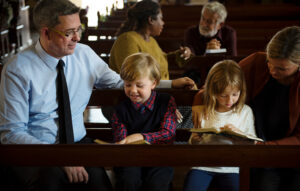Neither Slave nor Free: American Churches in the Fight Against Racism
by Brooklyne Oliveira
August 17, 2020
In the quest for racial justice in America, Christian leadership has a significant role to play. While the Black Church in America has historically led the effort of combating racism and prejudice through education and activism, white Protestant churches also have a positive role to play in the examination and reversal of racial prejudice in Christian communities. Through diversifying theological perspectives and catalyzing religious actors as community leaders and educators, predominantly white churches have the potential to instruct and mobilize their congregations in the fight against racism.
Christianity’s role in combating racism must be accompanied by reckoning with its particularly racialized history in America. In the late 18th and early 19th centuries, African Americans were expected to attend church with whites, but were forced to sit in separate balconies or areas referred to as “slave galleries.” Eventually, the Free African Society led a movement to exit white churches and subsequently to establish an independent black church. The exit of African Americans from white churches only accelerated with the Emancipation Proclamation. Today, the segregated development of these churches is reflected in the racial homogeneity of Christian churches across the United States and the continued complicity of churches in the perpetuation of institutional racism.
As religious leaders attempt to upend this legacy, there are figures from within the Christian tradition that offer helpful perspectives and models for approaching issues of institutional racism. For example, Dietrich Bonhoeffer, a notable Protestant theologian, wrote that the Church’s first job was to serve as a place of confession and repentance. Bonhoeffer was particularly vocal about the German Church’s responsibility to speak out collectively against Nazism during WWII. Following Bonhoeffer’s lead, religious actors may identify a theological framework for the acknowledgment of how American churches have historically perpetuated racism. Bonhoeffer’s example also demonstrates that individualistic theological readings of sin and salvation may be balanced with more collective understandings of sin and salvation, identifying a clear role for the church in the work of acknowledgment and reconciliation.
Another way in which Bonhoeffer’s vision may be realized is through religious actors’ embrace of their role as educators in the fight for justice, a role which Black Church leaders have long recognized and fulfilled, and from which Bonhoeffer himself undoubtedly benefited. Not only do faith leaders have the capacity to educate their lay congregants, but they can also educate and instruct individuals who hold positions of authority within their church communities. Consequently, religious actors are uniquely positioned to address racism on both the clerical and congregational levels. Religious leaders could provide anti-racism training and curriculum to effect change in both church administration and the broader congregation.
Pastors and faith leaders may also organize small group studies for more theologically inclusive and diverse education, like this reading club set up at Irving Bible Church in Dallas dedicated to tackling a reading list about racism. In predominantly white churches, especially, studies on black theology, liberation theology, or racism in America could be particularly helpful. There is a wealth of black liberation and womanist theological sources that faith leaders could engage to elevate black voices.
The work of theologians such as Willie Jennings, James Cone, Delores Williams, or Eboni Marshall Turman could be prioritized as faith leaders seek to elevate and engage black perspectives. James Cone, for example, famously authored Black Theology & Black Power, as well as A Theology of Black Liberation, works which advance a powerful critique of white theology and relate the struggle for black liberation to the gospel story of salvation. Delores Williams, on the other hand, develops a womanist theology that argues for the inclusion of women of color in traditional liberation theologies. While not without critique, the works of these theologians could provide a basis for understanding the roots of racial prejudice within Christian communities and theologies while offering alternative, racially inclusive theologies.
Despite the Christian tradition’s history of perpetuating or even sanctioning racism in America, American religious leaders are in a unique position to combat racism. Even Americans without religious affiliation see churches as playing a key role in fighting racism across the country. It should come as no surprise, given the fact that the Christian tradition offers a powerful message against oppression in all forms and often validates and undergirds movements of liberation. The role of faith leaders as educators of their clergy and congregants means they can meaningfully inform, influence, and mobilize their congregations in the liberation of people of color from racial oppression.
The views, thoughts, and opinions in this blog belong solely to the author and are not representative of an official position or endorsement by the International Center for Religion & Diplomacy (ICRD).






 Skip to content
Skip to content

